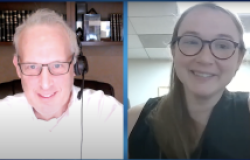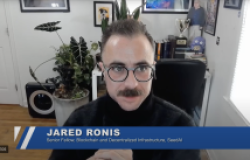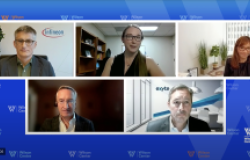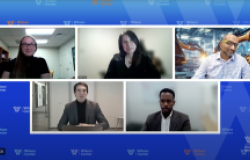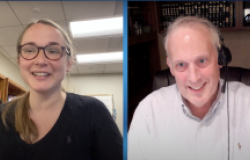Taking Games Seriously
The Wilson Center's Foresight and Governance Project recently convened game developers and policymakers to explore the application of computer games to challenges facing our public sector. The first "Serious Games Day" featured computer games that address issues such as government recruitment, first responder training, and budgeting.

The Wilson Center's Foresight and Governance Project has launched a "Serious Games Initiative," which seeks to encourage development of games simulating policy making and management. In a workshop held on December 9, 2003, four specific games were demonstrated:
- America's Army: The Official U.S. Army Game
- Space Station: SIM
- Incident Commander
- MASSBalance
Proposals for Future Serious Games
At the end of the workshop, participants were asked to develop ideas for computer games that could be applied to public policy issues. No attempt was made to critique these ideas or examine them in more depth in terms of cost, feasibility, etc. The goal of the exercise was to generate as many ideas as possible. Here is what resulted:
A game that:
- Challenges people to balance the federal budget (federal equivalent of the game MassBalance used for the Massachusetts budget)
- Teaches kids about global issues (this game could be tied to the United Nations Millennium Goals)
- Encourages adults and children to play together
- Explores spiritual choices confronting humanity
- Elucidates large issues facing the nation, such as the decision to go to war or to invest in Medicare
- Improves strategic decision making at leadership levels of government
- Lets people run an election campaign
- Assists with/models Regional/State/Local multi-modal transportation scenarios
- Plays out possible scenarios for a "weapons of mass destruction" attack
- Allows the exploration of social issues and can be made available to many people through commercial game portals (for instance, a game to educate people about racial profiling at airports)
- Enables security policy decision makers to see and address the unintended consequences of their decisions before those decisions are actually implemented
- Shows managers what effects their programs, projects, and selection of future leaders are likely to have on the future effectiveness and legitimacy of the organization
How to Get More Games Built
Workshop participants had a discussion about barriers faced by developers of Serious Games as well as potential opportunities to facilitate the greater use of such games.
- TIME MATTERS. Strategies to reduce transaction costs and time for developers interacting with public sector clients are needed.
- BETTER UNDERSTANDING of barriers to entry for smaller companies that may be prime vendors on government contracts for game development, and strategies to overcome these barriers.
- STANDARDIZATION---as a means of making computer games more accessible to government procurement. People were not uniformly enthusiastic about standards. However, some people felt that meta-standards governing transparency, peer-review of analytical algorithms, etc. might be helpful.
- EXAMINE long-term issues facing public sector entities that are not likely to go away as potential markets (for instance, a game to examine health care options for a "greying" population).
- CONNECT game use to public sector requirements for licensing, certification, etc. (for instance, getting a driver's license, ethics training).
- TARGET broad potential audiences in the public realm (for example, teachers around education policy games, or public health officials and doctors around health care simulation games)
- COORDINATE PUBLIC SECTOR SUPPORT (across agencies and/or across federal/state/local levels) to help aggregate funding sources or market demand for serious games.
- FOCUS ON GENERIC GAMES that could then be customized for particular use across multiple organizations.
- DEVELOP SPECIFIC TECH TRANSFER STRATEGIES and associated resources to move games from the game development industry into the government and non-profit sectors.
- GET MORE INFORMATION OUT to GAME DEVELOPERS on mechanisms such as the Space Act Agreement or Cooperative Research and Development Agreements (CRADA's), which facilitate cooperation with government entities.
- UNDERSTAND how FEDERAL ACCESSIBILITY STANDARDS for various handicaps may affect game design.
- DEVELOP INTRODUCTORY MATERIAL for federal people who are interested in the subject (a type of Serious Games 101 course, possibly on-line).
The workshop, made possible through support from the Lounsbery Foundation, was organized with Digitalmill, a development firm responsible for the Virtual U project , a game-based simulation of university management.
In a workshop held earlier in the year, game designers and policymakers brainstormed about games involving management of parks, high schools and hospitals. Read more about that event.
David Rejeski, director of the center's Foresight and Governance Project, says he hopes to see other games that would help citizens and government officials learn how to orchestrate disaster relief, make better health care choices and grapple with urban sprawl. "The goal of electronic-based gaming," he explains, "is not just to raise a generation of digitally ambidextrous kids but to create intellectually ambidextrous decision-makers as well."
Upcoming Serious Games Summit
The Serious Games Summit, to be held March 22-23, 2004 will feature representatives from the game industry, academics, government, and the private sector who will bring more definition to this emerging field. The Summit will provide crucial information to developers who want to build serious games and organizations who wish to put serious games applications to use. The Summit was developed by the Serious Games Initiative (www.seriousgames.org) as well as other leading advocates of using games for learning, training, and policy including "Digital Game-Based Learning" author Marc Prensky, game designer Noah Falstein, Breakaway Games CEO, Doug Whatley and the International Game Developers Association.
The Serious Games Summit will take place during the annual Game Developers Conference (GDC) in San Jose, Calif. The GDC is the largest and most important professional development event for the game development community. Scheduled for March 22 - 26, 2004 the conference features more than 300 lectures and workshops designed to provide inspiration and build skills, and provides an independent forum for developers from around the world to set the agenda for the next generation of games.
Read more about the conference from the official website.
Read a press release about the conference.
Related Links
- Serious Games Summit--Game Developers Conference 2004
- Serious Games Summit--Game Developers Conference 2004
- Serious Games Summit--Game Developers Conference 2004
- Serious Games Summit--Game Developers Conference 2004
- Serious Games Summit--Game Developers Conference 2004
- Serious Games Summit--Game Developers Conference 2004
- Serious Games Summit--Game Developers Conference 2004
- Serious Games Summit--Game Developers Conference 2004
- Serious Games Summit--Game Developers Conference 2004
- Serious Games Summit--Game Developers Conference 2004
- Serious Games Summit--Game Developers Conference 2004
Related Programs

Science and Technology Innovation Program
The Science and Technology Innovation Program (STIP) serves as the bridge between technologists, policymakers, industry, and global stakeholders. Read more

Serious Games Initiative
The Serious Games Initiative communicates science and policy complexities through the world’s most dynamic medium: gaming. Read more


